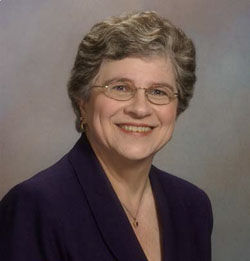DISTINGUISHED ALUM: DR. SUSAN SPERAW
- ucla-son
- Apr 14, 2016
- 3 min read

Trailblazer is a word that defines Distinguished Alumnae Susan Speraw, MN ‘92. An unconventional career path led her from caring for migrants and refugees from wars in El Salvador and Southeast Asia, to founding a unique nursing program focused on global and disaster nursing, to bringing running water and emergency preparedness to a rural community in Appalachia.
But first, she had to get into graduate school.
Wait listed for the Master’s program at UCLA, she was ultimately admitted and quickly adopted the motto that has framed her career: be fearless. Her first class introduced her to an inspirational mentor who opened her world to the excitement of research and the path of teaching. “I was so grateful for Dr. Pamela Brink who taught with passion, hired me as a teaching assistant, then helped me get my first teaching job at Azusa Pacific University, which then led to a position at USC.” Brink also inspired her to get her doctorate “because in so many ways it would enable me to continue to grow and contribute to the profession I loved.”
For several years, Speraw worked at USC/LA County Hospital where she saw staggering numbers of women, immigrants from Southeast Asia and El Salvador, many who had been sexually assaulted, were often desperately sick and having babies without husbands or family support. Working with people who were in dire straits led her first to the master’s program at UCLA, and then to obtain a doctorate in clinical psychology because “With my master’s degree I knew my clinical nursing skills were good but I wanted more advanced training to help these patients through the emotional trauma they had experienced.”
In 1993, she accepted a faculty position at the University of Tennessee College Of Medicine–Chattanooga, where she worked with childbearing families who had chronically or terminally ill children. In 2002, she moved to the University Of Tennessee College Of Nursing in Knoxville, where she was presented with two amazing opportunities that framed her career.
In 2004, the 9/11 commission report had just been published and while the report discussed how fire and police and other first responders could work better together, nursing wasn’t mentioned. “I thought, this was wrong. We needed nursing represented at the highest levels of disaster response leadership because the first person you are likely to see in an emergency is a nurse, and nurses are experts in working with other disciplines,” said Speraw. She wrote a grant that would train nurses to be leaders of disaster response teams. “Creating this program put all of my experience together – nursing, working with displaced people, managing physical problems related to emergencies, and providing emotional support to people in traumatic situations.” Her work led to the development of the Mass Casualty and Homeland Security Nursing program, which evolved into Global Disaster Nursing, the only program of its kind in the US. She also established the Tennessee Center for Preparedness and Emergency Response at the UT College of Nursing, Knoxville. Through partnerships she developed with leaders in government agencies, she was the first doctorally-prepared nurse invited to the Radiation Effects Research Foundation in Hiroshima, Japan, and with them developed a fully-funded internship program for Global Disaster Nursing students to study radiation effects there.
Speraw’s passion for caring and commitment to advancing training opportunities for her disaster nursing students lead to the next opportunity: The Appalachia Community Health & Disaster Preparedness Project, which focused on improving health and quality of life for the residents of Clay County, Kentucky. Ranked “hardest place to live in America,” its residents have long been plagued with health issues and lack of sanitation and clean running water. Speraw formed and led an interprofessional team comprised of educators and graduate students in disaster nursing, engineering, architecture, and law enforcement innovation. Together with the local community, the group brought clean running water to the area, and developed emergency resources. The experience gave disaster nursing students invaluable experience; working in isolated communities and with diverse disciplines—requisite skills for disaster leadership—high-intensity exposure to clinical work in low resource settings, and improving health in disadvantaged communities.
“In all the decades of my nursing career, there was never a day that I didn’t learn something new. There was never a time I wasn’t expanding my options and seizing opportunities for innovation. My career has been rich, textured, and amazing.



Comments